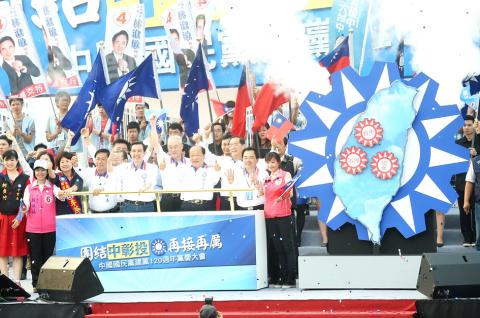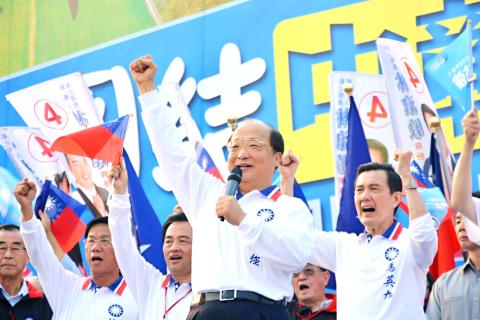The celebration of the 120th anniversary of the founding of the Chinese Nationalist Party (KMT) — held in Greater Taichung yesterday — sent a clear message that the party is emphasizing election results from central Taiwan.
The joint entrance of President Ma Ying-jeou (馬英九), who doubles as KMT chairman; Taichung Mayor Jason Hu (胡志強), who is seeking re-election; Nantou County commissioner candidate Legislator Lin Ming-chen (林明溱); and Changhua County commissioner candidate Legislator Lin Tsang-min (林滄敏) demonstrated the region’s importance to the party.
All featured in the closing scene, turning on a “great wheel symbolizing the turning of the tide for central Taiwan,” which also attempted to emphasize that only by voting for KMT candidates would residents of the region see a better future.

Photo: Liao Chen-huei, Taipei Times
“We hope the party will win in the upcoming elections, continuing its reforms and paving the path to winning the 2016 presidential elections,” Ma said as a “birthday wish” for the party.
Governmental policies have caused an increase of international tourists to central Taiwan, reaching 8 million compared with the 3.7 million when the KMT came to power more than seven years ago, Ma said.
Ma added that Nantou County received more subsidies under the KMT government than under the Democratic Progressive Party (DPP), saying that most of the funding was due to Lin Ming-chen’s successful negotiations.

Photo: CNA
The party believes that the tourism industry in Nantou County will certainly prosper under Lin Ming-chen, Ma said.
Earlier yesterday, Ma also visited Chiayi City in an effort to campaign for Chiayi mayoral candidate Chen Yi-chen (陳以真) and KMT city council candidates, but the event was an awkward leg of the journey: Chen was a no-show, while just three city council candidates made an appearance.
While some KMT supporters said Chen’s absence was a show of disrespect and could be taken as proof that Chen was seeking to distance herself from the president, Chiayi Mayor Huang Min-hui (黃敏惠), a KMT member, said Chen’s vacancy was simply due to a clash between schedules.
Later yesterday, Ma arrived in Greater Tainan to campaign for mayoral candidate Huang Hsiu-shuang (黃秀霜), who is president National Tainan University, before visiting Greater Kaohsiung to campaign for the KMT’s Greater Kaohsiung mayoral candidate, Minister Without Portfolio Yang Chiu-hsing (楊秋興).
Additional reporting by Chen Hsin-jen and Wang Shan-yen

Intelligence agents have recorded 510,000 instances of “controversial information” being spread online by the Chinese Communist Party (CCP) so far this year, the National Security Bureau (NSB) said in a report yesterday, as it warned of artificial intelligence (AI) being employed to generate destabilizing misinformation. The bureau submitted a written report to the Legislative Yuan in preparation for National Security Bureau Director-General Tsai Ming-yen’s (蔡明彥) appearance before the Foreign Affairs and National Defense Committee today. The CCP has been using cognitive warfare to divide Taiwanese society by commenting on controversial issues such as Taiwan Semiconductor Manufacturing Co’s (TSMC, 台積電) investments in the

INVESTIGATION: The case is the latest instance of a DPP figure being implicated in an espionage network accused of allegedly leaking information to Chinese intelligence Democratic Progressive Party (DPP) member Ho Jen-chieh (何仁傑) was detained and held incommunicado yesterday on suspicion of spying for China during his tenure as assistant to then-minister of foreign affairs Joseph Wu (吳釗燮). The Taipei District Prosecutors’ Office said Ho was implicated during its investigation into alleged spying activities by former Presidential Office consultant Wu Shang-yu (吳尚雨). Prosecutors said there is reason to believe Ho breached the National Security Act (國家安全法) by leaking classified Ministry of Foreign Affairs information to Chinese intelligence. Following interrogation, prosecutors petitioned the Taipei District Court to detain Ho, citing concerns over potential collusion or tampering of evidence. The

‘COMPREHENSIVE PLAN’: Lin Chia-lung said that the government was ready to talk about a variety of issues, including investment in and purchases from the US The National Stabilization Fund (NSF) yesterday announced that it would step in to staunch stock market losses for the ninth time in the nation’s history. An NSF board meeting, originally scheduled for Monday next week, was moved to yesterday after stocks plummeted in the wake of US President Donald Trump’s announcement of 32 percent tariffs on Taiwan on Wednesday last week. Board members voted to support the stock market with the NT$500 billion (US$15.15 billion) fund, with injections of funds to begin as soon as today. The NSF in 2000 injected NT$120 billion to stabilize stocks, the most ever. The lowest amount it

NEGOTIATIONS: Taiwan has good relations with Washington and the outlook for the negotiations looks promising, Minister of Economic Affairs J.W. Kuo said Taiwan’s GDP growth this year is expected to decrease by 0.43 to 1.61 percentage points due to the effects of US tariffs, National Development Council (NDC) Minister Paul Liu (劉鏡清) said at a meeting of the legislature’s Economics Committee in Taipei yesterday, citing a preliminary estimate by a private research institution. Taiwan’s economy would be significantly affected by the 32 percent “reciprocal” tariffs slapped by the US, which took effect yesterday, Liu said, adding that GDP growth could fall below 3 percent and potentially even dip below 2 percent to 1.53 percent this year. The council has commissioned another institution